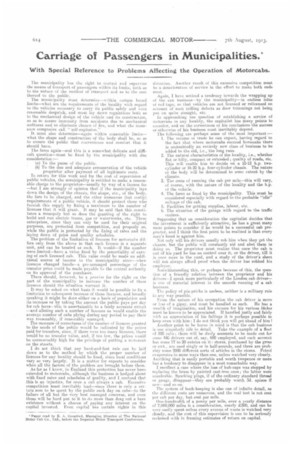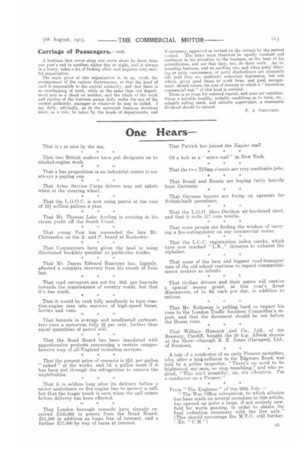Carriage of Passengers in Municipalities.
Page 2

Page 3

If you've noticed an error in this article please click here to report it so we can fix it.
With Special Reference to Problems Affecting the Operation of Motorcabs.
The municipality has the light to ceutrel and supervise the means of transport of passengers within its limits, both as to the nature of the method of transport and Cs to the cost thereof to the public.
The municipality must determine—within certain broad limits—what are the requirements of the locality with regard to the vehicles necessary .to carry its public safely and with reasonable despatch, and must lay down regulations both as to the mechanical design of the vehicle and its construction, so as to assure immunity from accidents due to mechanical unfitness and to eliminate chance of fire, and what the insurance companies call " self-explosion." It must also determine—again within reasonable limits— what, the shape and construction of the body shall be, so as to ensure the public that convenience and comfort that it should have.
The fares again—and this is a somewhat delicate and difficult questien—must be fixed by the municipality with due consideration :— (a) To the purse of the public.
• (6) To the. due and adequate remuneration of the vehicle proprietor after payment of all legitimate costs. In return for this work and for the cost of supervision of public vehicles, the municipality is entitled to make a reasonable charge to the proprietor—usually by way of a licence fee —but I am strongly of opinion that if the municipality lays down the design of the chassis, the shape, etc., of the body, the fare to be charged, and the other numerous (but costly) requirements of a public vehicle, it should protect those who furnish this supply by fixing a maximum to the number of licences that it will grant. It may be said that this constitutes a monopoly but so does the granting of the right to build and run electric trams, gas or waterworks, etc. These enterprises, since they can only be used for their original purposes, are protected from competition, and properly so, while the public is protected by the fixing of rates and the laying down of price and quality schedules. . The problem of the limitation of licence e for motorcabs differs only from the above in that each licorice is a separate unit, and can be treated as such. It would—if the number were limited—have a value fixed by the potentiality of earning of each licensed cab. This value could be made an additional source of irksome to the municipality since—when licences changed hands—a pre-arranged percentage of the transfer price could be made payable to the central authority -on its approval of the purchaser. There should, however, be a prorign for the right on the part of the municipality to increase the number of these licences should the situation warrant it..
It may be asked on what basis it would be possible to fix a limitation to subsequent, increase of these licences, arid broadly speaking it might be done either on a basis of population and its increase or by taking the amount the public pays per day for cab fares—this is ascertainable to a fairly accurate extent —and alloting such a number of licences as would enable the average number of cabs plying during any period to pay their way reasonably, if reasonably managed.
The measure of correctness of the number of licences granted to the needs of the public would be indicated by the prices paid for transfers, since, if there were too many licences, there would he no transfer value, and, if too few, the prices would be unreasonably high for the privilege of putting a metorcab on the streets.
do not think that any hard-and-fast rule can be laid down as to the method by which the proper number of licences for any locality should be fixed, since local conditions vary so very largely. It is a matter for experts to consider when all the factors of the problem are brought before them.
As far as I know, in England this protection has never been extended to motorcabs, although the business is hedged about with fixed rates and schedules of quality, and I contend that this is an injustice, for once a cab always a cab, Excessive .competition must inevitably lead—since there is only a certain sum to be spent by the public each day on cabs—to the failure of all but the very best managed concerns, and even these will be hard put to it to do more than drag out a bare existence without a chance of paying any interest on the capital invested. Even capital has certain rights in this
direction. Another result of this excessive competition must be a deterioration of service in the effort to make both ends meet.
Again, I have noticed a tendency towards the wrapping up of the eat) husines-1y the municipality—in endless folcis of red tape, so that vehicles are not licensed or reliceinsed on account of such trifling defects as door trimmings not being put on quite straight, etc.
In approaching line question of establishing a service of motorcans in any locality, the capitalist has many points to consider, and on the correctness 01 his conclusions the success or otherwise of his business must inevitably depend. The following are perhaps some of the most important:
1. The volume OI trade he can expect, having regard to the fact that where motorcabs succeed horsecabs there is undoubtedly an entirely new class of business to be added to the old, i.e., the long runs.
2. The natural characteristics of the locality, i.e., whether flat or hilly, compact or extended ; quality of roads, etc. This will enable him to decide on a. 10-12 h.p. twocylinder or 16-20 h.p. four-cylinder chassis. The nature et the body will be determined to some extent by the climate.
3. The costs of running the cab per guile—this will vary, of course, with the nature of the locality and the h.p. of the vehicle.
4. The fares as fixed by the municipality. This must be considered especially with regard to the probable "idle" inileage of the cab.
5. Facilities for getting supplies, labour, etc. 6. The situation of the garage with regard to the traffic centres.
6upposing that on consideration the capitalist decides that the investment is sufficiently attractive he has a great many mere points to consider if he would be a. successful cab proprietor, and I think the first point to be realized is that every man's hand is against him. Not only will his drivers usually rob him when they get the thence, but the public will constantly aid and abet them in doing so. The proprietor must realize that once the cab is out of his yard he has no control over it, or the driver, till it is once more in the yard, and a study of the driver's sheet will not always afford proof when the driver has robbed his employer. Notwithstanding this, or perhaps because of this, the question of a friendly relation between the proprietor and his drivers—I speak more particularly of the London cab driver— is one of material interest in the smooth running of a cab tam:mese, The policy of pin-pricks is useless, neither is a military rule in any way possible.
From the nature of his occupation the cab driver is more or Isss of a gips, and must be handled as such. He has a wealth of imagination, and his excuses for his various 16,che.1 must be known to be appreciated. If handled justly and fairly with an appreciation of his failings it is perhaps possible to keep even with him: I do not think you will get ahead of him! Another point to he borne in mind is that the cab business is one singularly rife in detail. Take the example of a fleet of 500 cabs ; there will be daily accounts to be made out far some 446 drivers out of, say, 600 employed, and each account has some 17 to 20 entries on it: stores, purchased by the gross or cwt.. are used singly or in half-pounds, and there are probably some 2000 different sorts of articles in the stores. Petrol evaporates in more ways than one, unless watched very closely. Anything that is easily portable and worth twopence or more has a tendency to disappear in a most remarkable way.
I recollect a case where the loss of hub-caps was stopped by replacing the brass by painted cast-iron ones; the latter were unsaleable. Sparking, plugs, if of the ordinary standard thread or gauge, disappear—they are probably worth 3d. apiece if new—and so on.
The system of book-keeping is also one of infinite detail, as the different costs are numerous, and the real test is not cost per cab per day. but cost per mile.
One-hundredth of a penny per mile, over a yearly distance of 7,000,000 miles is a consideration, nearly £300, and can be very easily spent unless every avenue of waste is watched very closely, and the cost of this supervision is one to be seriously reckoned with in framing estimates of return on capital. A busines.s that never stops and never shuts its doors from one year's end to another, either day or night, and is always in a hurry, takes a lot of looking after, and requires very careful organization.
The main point of this organization i.s, to my mind, the arrangement of the various departments, so that the head of each is responsible to the central authority, and that. there is no overlapping of work, while at the same time one department acts as a cheek on another, and the whole of the work and routine of the business passes daily under the eye of the central authority, manager or whatever he may be called. I say daily, advisedly, as in the motoreab business decisions must, as a rule, be taken by the heads of departments, and if necessary, approved or revised on the instant by the central control. The latter must therefore be equally constant and assiduous in his attention to the business, as the least of his subordinates, and see that they, too, do their work. An interesting business, and an exciting one, and when petty thieving or petty carelessness, or petty disobedience are unusually rife (and they are epidemic) somewhat depressing, but one which, given good bases to work from, and good management, should return the rate of interest to which a "hazardous commercial risk " of this kind is entitled.
There is no room for watered capital, and none for nepotism. Given a suitable locality, suitable conditions as to fares, etc., suitable rolling stock, and suitable supervision, a reasonable dividend should be earned.
F.. A. GREATHST1.




















